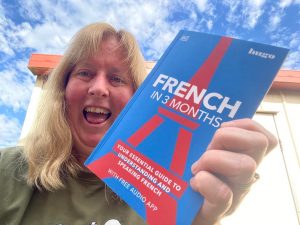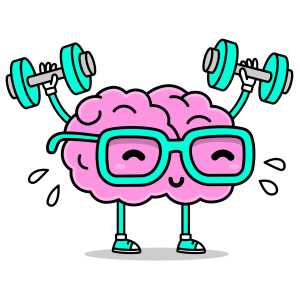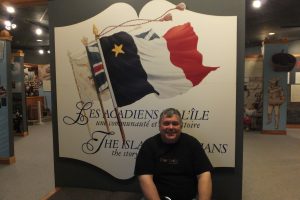When I was at high school in the Dark Ages (i.e., the 1970s), everyone in the academic stream had to learn a language. We only had two choices: French or German. As my maiden name was Wildermuth, it wasn’t surprising that I was swept into the German stream.
We had five fun-fuelled years of conjugating verbs and singing In München Steht ein Hofbräuhaus at the local shopping mall during German Week. I did actually visit that hofbräuhaus (beer hall) in Munich during a tour in 2004, but I only drank Coke and could barely manage an ‘eins, zwei, g′suffa’.
My French was limited to the most obvious expressions that I’d picked up from TV shows and movies, like oui, merci, c’est la vie, and Celine Dion.
A few weeks ago, I decided that it would be a good idea to rectify that and learn a little French. I’m using the free version of duolingo, which is a fun way to learn a language online. You can learn everything from Danish to Swahili to Klingon. (Yes there really is a Klingon category!). I’m also using a couple of books: French in Three Months and an Easy French Reader, which both come with handy apps to help with pronunciation.

After just a few weeks, I can now say ‘the cat is eating an orange’ and ‘we have beer’. I don’t have a cat or drink beer, but maybe those expressions will come in handy if I ever get back to that hofbräuhaus.
So why have I suddenly decided to learn French? There are three main reasons.
Keeping the Brain Active

Now that I’m in my early 60s (how did that happen?), I’m more conscious of aging and the things that go along with it. I now have trouble hearing certain sounds, dancing to Nutbush City Limits without falling over, and wondering why I’m standing in the living room holding a banana and a glue stick.
While research isn’t definitive on whether cognitive training can prevent conditions like dementia, some studies suggest that it may delay its onset. At the very least, keeping our minds active, along with good nutrition, exercise, social engagement and other health-related activities, is part of aging well. I’d like to think that my mind will be active right up until my last breath. Learning a language is just one more cognitive gizmo in my tool kit.
But why did I choose French over Swahili or Klingon? That relates to my next two reasons.
I Love Canada
I’m fortunate to have been to Canada four times—twice on holidays with my husband Tim, once for a conference, and once to visit my cousin Lynn (the woman who discovered the Badlands Guardian land formation that looks like an Indian Chief wearing ear buds).
I’ve been to Nova Scotia, Prince Edward Island, Newfoundland, Ontario, British Columbia, Alberta, Saskatchewan, a tiny little bit of the Yukon, and a teeny corner of New Brunswick that you pass through to get to the bridge to PEI. I love it all and would go back tomorrow if I could. However, I’ve never been to Quebec, the main French-speaking province.

French and English are both official languages in Canada. Although signs are usually in both languages, I’d like to be able to read the French words. I also live in hope of running into Yannick Bisson, the star of Murdoch Mysteries, and win his undying friendship by saying in French ‘Your cat can eat my orange’. Actually, I’m allergic to oranges, so maybe his cat can eat my croissant. All this assumes that I will one day go back to Canada, and I really hope that is the case.
It Relates to My Next Novel

When Tim and I visited Prince Edward Island (PEI) in 2012, I noticed a lot of flags that looked French, except that they had a star in the top left-hand corner. When we were sightseeing one day, we stumbled across the Musée Acadien (Acadian Museum), and discovered that we’d been seeing Acadian flags.
Through some detailed, and sometimes confronting displays and artwork, the museum tells the story of the French Acadians who had settled on PEI in the 1720s, were forcibly deported by the British in 1758, and allowed to return in 1764. That’s a very brief and sanitised version of a much larger history that I’m only just starting to learn about. Suffice to say that it sparked my interest.
I don’t want to give too much away, especially as I’m still working out the details, but one of the secondary characters in my follow-up novel to Scattered will be Acadian. It’s set on PEI in 1896, and I’d like my Acadian character to be able to throw in the odd French word, phrase and sentence.
Now I know there are already a couple of logistical problems. Canadian French will no doubt have some different pronunciation and local phrases, not to mention the difficulty of working out what Acadians would have said in 1896. However, if I’m going to research that part of history for my subplot, it can’t hurt to learn a little French.
How about you? Can you speak a second language (or two or three)? What do you do to keep your mind active? I’d love to hear your stories.
Picture Credits
Featured photo by Evren Ozdemir on Pixabay. Brain cartoon by Riad Tchakov on Pixabay. Other photos by Nola Lorraine.


2 Responses
Good on you for tackling a new language, Nola! To quote two of my characters in Licence to Die (GRUnGE.001):
‘It’s a useful skill … having a second language. Une autre langue invite le monde dans votre vie.’
‘You speak French!’
‘Oui, mon ami. Another language invites the world into your life.’
From an editing perspective, using other languages within a text does pose challenges, like the need to find a native speaker from the character’s country of origin to check subtle usage nuances (just as Aussies use English differently to Americans etc), and also finding inconspicuous ways to convey the meaning of what was said to those who won’t understand it. (as above).
As to keeping one’s brain in train and on track for a healthy, spirited passage through (we hope, many many) years of old age, I can absolutely recommend tackling new learning challenges in your sixties!
Thanks for that, Mazzy. I think once I have a draft of the novel, I’ll need to not only find a French-Canadian to cast an eye over it, but an Acadian from PEI, as there seem to be a lot of variations. But I won’t have too many French expressions and they’ll be pretty basic.
And you’re a great example of someone who has had a few challenges, but has never shied away from the learning curve. All of the things you had to learn in order to publish your novel are amazing. Several learning curves above me. Here’s to keeping each other’s synapses firing well into old age. Thanks for taking the time to comment.